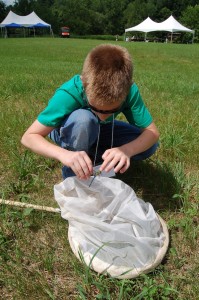
Despite torrential rains that left some roadways in Northern Wayne County impassable on June 28, teams of scientists and volunteers managed to make their way to Starlight, PA on time to commence a 24-hour collection period to catalogue as many life forms as possible during the first Upper Delaware BioBlitz.
“The event was a huge success with 50 world-class scientists from throughout Pennsylvania and New York participating in the collection, identification and cataloguing of over 1,000 separate species of plants, animals and insects,” said event organizer, Steve Schwartz. “They were helped out by amateur naturalists including an entire 4H club from Monroe County on the insect team. Over 25 volunteers helped run the event and ensure it operated smoothly.”
On June 29, the public had the opportunity to visit the 64-acre property owned by the Norcross Wildlife Foundation and interact with the scientists as well as participate in various demonstrations and tours. Teams of researchers focused on specific categories including aquatic macroinvertebrates, birds, botany, fish, fungi, reptiles and amphibians, invertebrates, mammals, mosses and lichens.

Shane Flory of the Monroe County 4H club, “Insects Are Us,” collected a common green darner dragonfly.
The primary goal of a BioBlitz is to compile a snapshot survey of the life on a particular property as an indicator of the biodiversity of the area. Data collected during the event will be added to data collected through other efforts such as the Pennsylvania Natural Diversity Inventory database, the NPS survey of Flora in the Delaware River Corridor, the 1991 Natural Areas Inventory of Wayne County by The Nature Conservancy and other sources.
Other goals include raising public awareness, fostering scientific interests in children and providing opportunities for collaboration and interdisciplinary research.
“The Upper Delaware BioBlitz gave us a glimpse into the amazingly rich and vital variety of life found in this landscape,” explained Don Hamilton of the National Park Service Upper Delaware Scenic and Recreational River, who served on the steering committee. “This diverse community of living things acts to efficiently enrich the soil, cycle nutrients, purify water, pollinate plants (including our crops) and create the very air we breathe—all ecosystem services that benefit and sustain us, which we could not easily re-engineer.”
Species were identified using a variety of collection protocols, ranging from actual capture to digital photography.
The Bird Team identified 55 different species, including a blue-gray gnatcatcher. An American black duck observed in the confluence of Shehawken Creek and the West Branch of the Delaware River is believed to have been blown in by the severe weather preceding the event. See the Bird Team’s E-Bird report.
As for the future, it is hoped that the event will continue to be held in various areas in the Upper Delaware region. “There is much interest in making it an annual event,” says Schwartz. “Perhaps it would alternate years between New York and Pennsylvania.”
Visit the BioBlitz website or “like” the event on Facebook to learn more.



